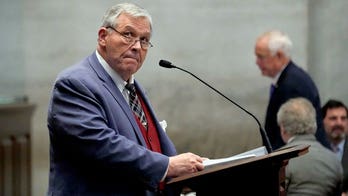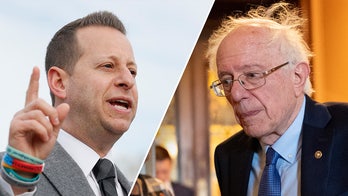“What we can do is avert the cliff in a manner that serves as a down payment on - and a catalyst for - major solutions, enacted in 2013, that begin to solve the problem.”
-- House Speaker John Boehner talking to reporters.
“Waiting for a month, six weeks, six months, that's not going to solve the problem. We know what needs to be done. And so I think that we should just roll up our sleeves and get it done.”
-- Senate Majority Leader Harry Reid talking to reporters.
President Obama is getting a third chance to become the unifying leader he promised to be in 2008 and spoke about in his victory speech this week.
His first opportunity was to be magnanimous after his sweeping victory four years ago and accommodate some conservative ideas. The Republicans, reeling after two consecutive wave elections against them, were at the weakest point for the party since Watergate.
Obama used that chance to push through his stimulus and health law in what seemed to be an effort to break the back of the minority party.
Obama’s next chance came after Republicans came roaring back in midterm elections. This provided Obama a chance to show voters that he was chastened and, having heard their message, would now work with the other side.
But Obama instead opted to simply ride out the storm and focus on his re-election. Both he and Republicans anticipated a decisive 2012 contest that would break the deadlock produced by successive wave elections.
Assuming that voters would express a clear preference between deeply divergent worldviews – small-government conservatism and big-government liberalism – the president and congressional Republicans talked past each other for months and resolved to shove any difficult decisions beyond the election they presumed would be decisive.
Instead, voters embraced the deadlock.
Obama was re-elected, but not on the basis of his agenda or accomplishments but because of his ability to convince voters of the dangers of the Republican nominee. Obama attacked Mitt Romney personally as greedy, cruel and dishonest and Romney’s party as a clutch of nuts who hate women, minorities and the poor.
Had the president won a referendum on Obamism he would now be in a position to plunge ahead. But having won in a referendum on Romney’s fitness for office, the president only has a mandate to be not Romney.
In Congress, Democrats failed utterly in their bid to use the starchy fiscal conservatism against the GOP. The plan was to use the deep cuts, entitlement changes and other policy provisions of the House Republicans as a tool to peel back most or even all of the 2010 Republican majority.
House Minority Leader Nancy Pelosi planned to use Rep. Paul Ryan’s budget blueprint against the GOP, but voters shrugged off the attacks and kept the Republicans in power and with a stout majority.
The Senate got more Democratic thanks to the blunders of Republican candidates in Missouri and Indiana and resourceful Democratic candidates in Montana and North Dakota.
[pullquote]
So Obama has a slightly firmer grip on power with a larger Democratic majority in the upper chamber. But House Speaker John Boehner is in better position too having survived the onslaught from Democrats and antagonists from within his own party.
But all the can kicking that when on during the time when it was assumed that the election this week would be decisive has created a time of peril and opportunity.
With just weeks to go before automatic, across-the-board tax increases and automatic reductions to defense and social programs, Washington is in a state of high anxiety.
Boehner has already made the first move to say that Republicans are willing to see taxes rise a bit for top earners as long as it is part of a larger tax reform plan and Obama has in the past shown himself open to the idea of additional cuts and entitlement reforms.
The question now, though, for the president is whether he is willing to use the opportunity of his re-election to become a unifying political figure.
Senate Democrats are already trying to pressure the president to stay small and use the urgency of the so-called fiscal cliff to jam through a deal now. What the president, Romney and others have been talking about – a grand bargain on taxes, spending and entitlements – is not popular in an increasingly liberal Democratic Party.
And while Obama hasn’t found a way to reach across the aisle in his first term, neither has he been able to do much to control his own party in Congress. Neither an authoritarian nor a dealmaker, the often-aloof Obama has faced repeated struggles with the Blue Team in Congress.
What Obama does between now and his inauguration will set the trajectory for his term and for the nation. If he can force his party to accept changes to entitlements in exchange for Republicans willingness to see tax bills rise for top earners, Obama could have a second term far better than his first.
Markets would soar and the economy would see an infusion of much-needed capital as investors felt the certainty needed to get back in the game.
But, if Obama can’t summon the will or ability in the next 74 days to at least have a deal in place, the economic anemia of the past two years will be extended and likely worsened and likely worsened.
If he makes the most of his third chance to unite and lead, Obama could see his legacy assured. If he fails to make the most of it, he will be a lame duck even before he takes the oath of office.
And Now, A Word From Charles
“I think Republicans can change their position, be a lot more open to actual amnesty with enforcement. Amnesty, everything short of citizenship. And to make a bold change in their policy. Enforcement and then immediately after, a guarantee of amnesty. That would change everything. If you had a Rubio arguing that it would completely up-end all the ethnic alignments.”
-- Charles Krauthammer on “Special Report with Bret Baier.”
Chris Stirewalt is digital politics editor for Fox News, and his POWER PLAY column appears Monday-Friday on FoxNews.com. Catch Chris Live online daily at 11:30amET at http:live.foxnews.com.




